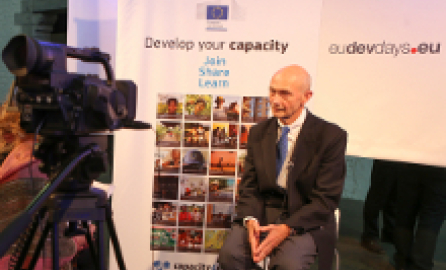The Oxford Martin Commission for Future Generations, a unique, interdisciplinary research community chaired by former World Trade Organization head, Pascal Lamy, released their long anticipated “Now for the Long Term” report in October. It offers frank discussion on how to break gridlock on major global challenges. At the recent European DevDays, Lamy spoke with us about the report, offering a line of thought that may resonate in the upcoming debate on the post- Millennium Development Goals framework.
The starting point of the report is that “humanity is at a cross-roads. This could be our best century, or our worst”. It urges decision-makers around the world to tackle world problems from a long-term perspective, so that decisions made today not only address current needs but also the challenges that will shape our future.
According to Lamy, one of the major challenges is the current institutional and geopolitical set-up.
He refers to the existing “Westphalian system” that arose in the 17th century, which entertains a sovereign states’ own interests. Several politicians and thinkers consider this to no longer be the best fit for the 21st century.
“The international system today, which is the one that has to cope with global international issues, remains based on sovereignty - so you have 200 sovereigns who have to agree to do something internationally, and obviously it doesn’t work,” said Lamy at the EU Dev Days. “This is probably the origins of big difficulties embracing challenges like climate change and trade opening.”
The solution he and the report’s wide group of researchers propose is to “stop trying to globalise local problems, try to localise global problems.”
In order to increase the productivity of global negotiations, the report recommends that more and varied voices be heard – by creating coalitions of motivated countries, together with other actors, including bottom-up, voluntary creative coalitions, often made up of non-state actors. City and business coalitions are also proposed.
Lamy said: “Take the Westphalian system, these 200 sovereigns, as it is. Leave them where they are, and try to do things, sometimes with them, sometimes without them on the basis of other coalitions, notably with cities. We have got a huge number of mega-cities on this planet, who are much more powerful than many of these 200 states. Business, and there are quite a large number of international businesses who are ready to invest in challenges, which have to do with managing global public goods. And of course civil society, which is at the end of the day what these 200 local politicians care about, because they are the ones that elect them or do not elect them.”
Since its release only six weeks ago, “Now for the Long Term - The Report of the Oxford Martin Commission for Future Generations” has been downloaded more than 500,000 times, in more than 130 countries.


Log in with your EU Login account to post or comment on the platform.